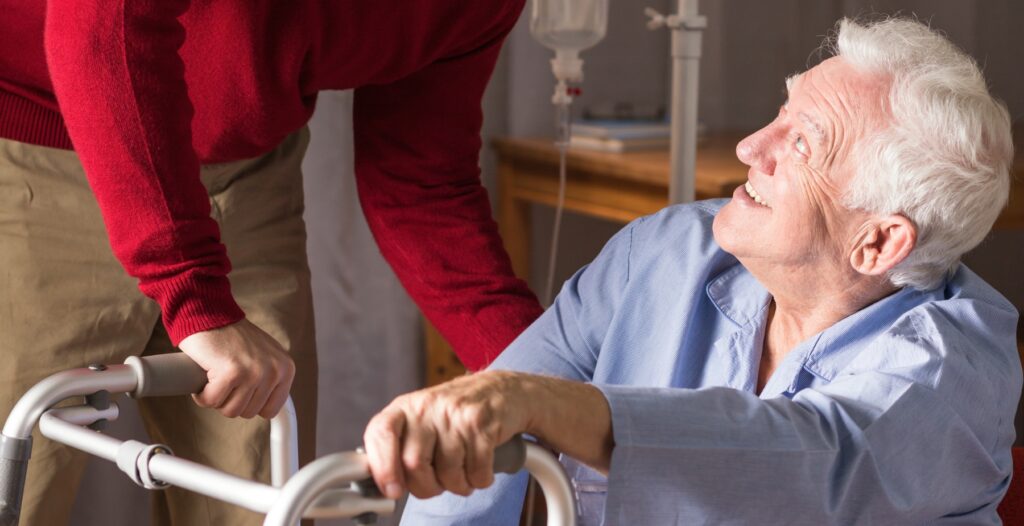
Many people become less mobile as they get older and may rely on you for help maintaining their health and getting around.
We can show you how to support someone and promote self-management of their own health, mobility and independence. Also to reduce your own risk of injury while caring for them.
Physiotherapy support for older people and their carers
Movement is good for the human body. It helps strengthen bones and muscles, manage weight and boost mental alertness.
If you are already assisting someone to stay stronger and more mobile, we will work with you to develop an informed, realistic and clear program.
| Reduce complexity | Optimise independence |
But how much exercise, rest, movement and motivation is optimal each day? What’s best for the person you care for? What’s manageable for them?
These are questions we can help answer, factoring in the person’s health and your own situation.
Age-related mobility difficulties
Age leads to many physiological changes that can affect a person’s mobility, such as:
- Decreased bone density
- Loss of muscle strength
- Declining eyesight or hearing.
Other issues that could affect your loved one’s mobility include:
- Arthritis
- Osteoporosis
- Chronic disease
- Weight gain
- Balance and coordination difficulties
- Previous injuries such as a fall or a broken hip.
We begin by developing a comprehensive picture of your loved one’s situation and your goals for our sessions. Many older adults have conditions like heart disease, circulatory or nerve inadequacy, pain, fear of falling or movement, and sometimes unhelpful underlying beliefs.
The combined effects of these can become clearer with a comprehensive assessment, and this may be a game changer in terms of realistic expectations and possibilities, enabling us to identify and navigate around likely roadbumps.
Caring for someone with limited mobility
Maybe your caring role developed gradually as the person’s mobility slowly declined. Or maybe, it began suddenly when they fell and injured themselves or had a major health event like a stroke.
Either way, you’re now helping them move throughout the day.
Mobility needs you may be helping with
| Getting in or out of bed | Getting in or out of a wheelchair | Bathing or showering |
| Dressing | Getting to the toilet / managing incontinence | Getting in or out of the car |
Protecting yourself as a carer
Caring can be physically demanding. Transferring or repositioning someone can place you at risk of backache, muscle strains and bruises.
Knowing how the balance between assisting someone and encouraging them to do it themselves can also be hard.
According to National Seniors, 45% of carers are aged 45-64. This is the most common age range for the diagnosis of chronic conditions, of your own such as high blood pressure, diabetes and arthritis. Women in this age bracket may also be experiencing menopausal changes.
It’s important to safeguard your own health as a carer. That includes eating well, managing expectations and stress and getting support when you need it.
Helping as much as they can with their own mobility helps people stay stronger and less dependent. Knowing at what point you need to physically assist someone when they have done as much as they can, can reduce body stress to yourself. We’re happy to help you develop your plan.
Get started with Jasmine Health Care
Telehealth physiotherapy has become much more mainstream, supported by Medicare, most private insurers and DVA. Results are comparable to face-to-face visits.
Jasmine HC’s physiotherapy-based support for older adults and those caring for them is through video or phone calls.
Your initial appointment is ideally through video call on your smartphone, tablet or computer. Many older people already use this technology to call interstate family or friends. If it’s unfamiliar at first, they’re often able to use the technology with assistance.
Assessments and follow-up sessions are more flexible. You might benefit from more frequent, shorter follow-ups where programs can be fine-tuned and questions answered.
For more information or to get started, please contact us.
Disclaimer
All information is general and is not intended to be a substitute for professional medical advice. Jasmine Health Care can consult with you to confirm if a particular treatment approach is right for you.